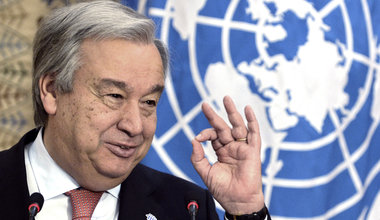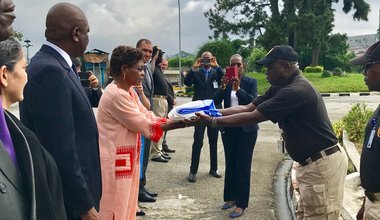Daily Brief on Cote d’Ivoire for Monday, 1 December 2008
Highlights
- Identification operation extended to 14 December in Abidjan
- Mixed Brigades dismantled in aftermath of strikes
- IDPs in western village of Zeaglo returning to plantations
Electoral process
The identification and voter registration operation in Abidjan, which was due to end on 29 November 2008, is to be extended to 14 December 2008. However, some centres in the commercial capital will be closed and a list of those which will remain open will be made public in due course. So far more than 1.5 million people have registered in Abidjan and about 40 000 in Bouaké.
Security
Civil society groups in Man this morning demanded to meet the Chief of Staff of the Armed Forces of the Forces Nouvelles (FAFN), General Soumaila Bakayoko, to express their concern over the dismantling of Mixed Brigades in the western towns of Zeale and Bangolo. General Bakayoko was attending a meeting in Man with his zone and sector commanders in Man to discuss the issue. The protesters said that they feared that the dismantling of the Mixed Brigades would have adverse consequences on an already precarious security situation. UNOCI has been told that the FAFN gendarmes and their counterparts from the Defence and Security Forces of Cote d'Ivoire (FDS-CI) have been asked to return to their respective forces by the Integrated Command Centre (ICC). It should be recalled that members of the Mixed Brigades in Zéale, Bangolo, Bonoufla in western Côte d'Ivoire and the eastern town of Ngattadolikro, went on strike last week in protest at the non payment of their salaries and allowances. They set up roadblocks along the Man - Duékoué road (west), the Daloa – Bonoufla road (centre west) and the Bouaké – Yamoussoukro road (centre) preventing any movement of traffic for three days. A detachment of 20 soldiers from the ICC has reportedly been sent to provide security in Bangolo.
IDPs
A delegation comprising UNOCI and UN agencies met on 28 November 2008 with internally displaced persons (IDPs), who have been living in the grounds of the Zeaglo sous-prefecture, near Blolequin (west), since youths prevented them from returning to their respective plantations. The team spoke with the community leader of the IDPs who said that people had been slowly returning to their plantations since 27 November 2008 but that eight families, whose homes were burnt, were still living in the grounds of the sous prefecture. It should be recalled that the IDPs were attacked by youths who objected to them returning to their plantations which they had been forced to abandon during the Ivorian crisis. The violent confrontation resulted in one death and 300 IDPs being forced to take refuge in the sous prefecture.
Humanitarian
UNOCI's Pakistani battalion (PAKBATT), on 30 November 2008, organized a medical camp in Alloko-Djékro village, some 55 km south-west of Bouaké. About 450 villagers were given free treatment and medicines, after which the peacekeepers also provided lunch for some of the villagers.
Human Rights
In Bondoukou, on 26 November 2008, a group of 36 policemen and gendarmes from Bondoukou, Koun-Fao, Sandegué, Nassian, Tanda, Tabagne and Transua in eastern Cote d'Ivoire, attended a workshop organized by the Regional Human Rights Office in the town. The workshop, which focused on human rights principles relating to arrest and detention, was prompted by the violent repression of young men during a demonstration against the exploitation of the region's timber resources by members of the police and the gendarmerie in August 2008.
The Regional Human Rights Office in Daloa, on 26 November 2008, conducted a fact-finding mission to Vavoua and Séguéla (centre west), in the aftermath of the violent confrontation between opposing factions of the FAFN in Séguéla on 24 November 2008. The Office confirmed that nine soldiers, including eight insurgents and one FAFN loyalist, were killed during the incident. So far, the bodies of four insurgents have been removed and buried by their families. Five others, of which four remain unidentified, are still at the mortuary. The death toll is likely to increase as search operations have continued within a 30 km radius around Séguéla. On 27 November 2008, the Office received unconfirmed reports that four more bodies had been found near Bobi, 40 km from Séguéla.
 ONU
ONU Nations Unies Maintien de la paix
Nations Unies Maintien de la paix




